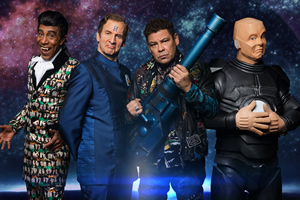Red Dwarf VI retrospective: Cowboys and Emmys
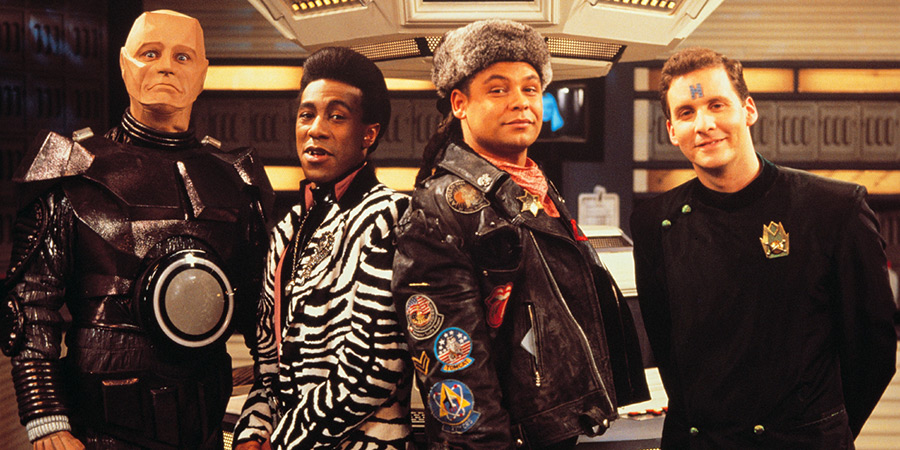
This is it, Series VI. Red Dwarf's jewel in the crown, a shining example of what fans have dubbed the "golden era" of the show, its reputation matched only by the series that precedes it, and the hype is more than deserved. After all, this was the series that featured Gunmen Of The Apocalypse - the episode that won Red Dwarf the 1994 International Emmy Award in the Popular Arts category, and it featured the returns of both Dwane Dibley and Ace Rimmer (honouring his promise that he'd be back for those kippers).
However, it also featured a devastating finale, one that ended on an ominous cliff-hanger - it was so dramatic that right after winning international acclaim, ratings success and adoration from sci-fi and comedy fans alike, it managed to leave the entire cast and crew convinced that the series was over and that its writers and creators, Rob Grant and Doug Naylor were about to end the show for good.
One of the most impressive feats of Series VI was its ability to showcase a continuing storyline in such a way that it didn't alienate the casual viewer. The series' scripts were all delivered to the cast and crew with the subheading The Starbuggers - the reason for this was that Red Dwarf itself was missing and the crew's search for their primary ship was the driving force behind each new adventure that Rimmer (Chris Barrie), Lister (Craig Charles), Cat (Danny John-Jules) and Kryten (Robert Llewellyn) all stumbled into across the course of the series. The loss of the mining ship happened off-screen, so we can't be certain what took place. Rimmer however, lay the blame squarely at Lister's door:
RIMMER: Gentlemen, as we're all aware, we have lost Red Dwarf. This is not the time for small-minded, petty recrimination. The time for that is when LISTER is court-martialled after we get back to Earth.
LISTER: I didn't lose it.
RIMMER: You're the one who parked it, Lister. You're the one who couldn't remember which planetoid you'd left it around.
LISTER: Yeah, but they all look the same, those little blue-green planetoids. They're all sort of little, blue-green and planetoidy.
KRYTEN: Sirs, please, there's no advantage in finger-pointing. We didn't lose Red Dwarf. Red Dwarf was stolen. By persons... or life forms unknown.
This piece of dialogue was dropped into Series VI's debut episode Psirens, which made a conscious effort to strike a slightly more dramatic tone. Who had stolen Red Dwarf? This was a mystery that wouldn't be resolved until the following series.
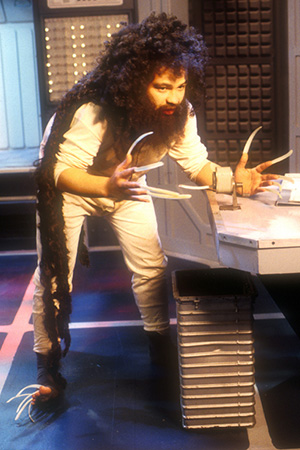
As the episode begins Lister emerges from a long period in stasis with elongated fingernails and a cave-man-like aesthetic, bewildered and with no memory of himself, this bout of amnesia (which was swiftly cured) marked the start of a new chapter in the show's history. Suddenly, Red Dwarf felt a little bit less like a sitcom and a little bit more like a continuing sci-fi drama. This subtle change of mood could be attributed in part to new director, Andy de Emmony, who gelled with the cast and crew immediately, as did new producer, Justin Judd (who had recently produced a pilot written by Rob and Doug for ITV, The 10%ers and had also worked with them on Spitting Image), helping slide the series into a subtle new direction.
With Red Dwarf's namesake ship now absent the crew's base became the Jupiter Mining Corporation's class II ship-to-surface transport vehicle, Starbug. This change cemented an image of "The Boys from the Dwarf" that has come to define the show - the sci-fi equivalent of the Fab Four, sitting in formation in the cockpit of Starbug. It's something that the revival era (broadcast on Dave from 2012 onwards) has made a huge effort to recapture; top left sits Kryten, top right, Rimmer, front left, Cat and front right sits Lister.
Almost by accident the look and feel of the smaller craft had overtaken Red Dwarf's gigantic and overbearing scale. Starbug had originally debuted back in Series III, where it was used to great effect as the location of Rimmer and Lister's iconic "bottle episode", Marooned, and had become a mainstay of the show ever since. More intimate, it offered a zippier look and feel, seeming more suited to fast-action space travel. Some might even suggest that it looked iconic enough to rival the TARDIS, and as far as the crew working on the series were concerned, a new, smaller, more manageable set allowed the entire show to look better - Kryten even acquired some nice new lights on the tops of his shoulders (but blink and you'll miss them working).
Series VI was recorded in the Spring of 1993 and broadcast in the autumn of the same year. It consisted of six episodes:
Psirens
Legion
Gunmen Of The Apocalypse
Emohawk: Polymorph II
Rimmerworld
Out Of Time
Psirens is of particular importance, not just because it established the changes between Series V and VI. It did something truly great that all sitcoms need: it gave Red Dwarf "a moment", a big statement gag, a scene that a person immediately calls to mind when they think of a classic sitcom. In Only Fools And Horses, Del Boy falls through the bar; in The Office, David Brent does his little dance to Disco Inferno; in Dad's Army, Mainwaring calls out "Don't tell him, Pike!"; and in Red Dwarf, Kryten gently chides Rimmer as he demands to step up Starbug's light-based early warning system to red alert: "Are you absolutely sure, Sir? It does mean changing the bulb."
It was Robert Llewellyn's peerless line delivery and total harmony with the script that allows this simple exchange to stand alongside these other classic sitcom moments. Red Dwarf was firing on all cylinders and with every new space corps directive uttered, it felt to the audience as though the show's future was becoming more and more assured - it had slowly become the BBC's new pillar of sci-fi entertainment, filling the gap left by Doctor Who. Yet a storm was brewing behind the scenes and plans were even put in motion to cancel the episode that would win the Emmy, Gunmen Of The Apocalypse.
"We'd always wanted to do a western," Doug Naylor revealed in the DVD-extra making of Series VI documentary, and what better place to film a western than in Kent? Namely, Kent's Laredo Town, which promised an authentic American Western experience. Featuring a collection of more than 24 buildings with no running water or electricity, it was founded in the 1970s by a like-minded group of cowboy enthusiasts and has since been used regularly for TV shoots, even featuring in a number of Hollywood films. This was the perfect place to make the episode, but the pressure of delivering high quality script after high quality script was starting to get to writers Grant and Naylor. The latter explained what happened when they went to check out the gunslinging capital of Kent:
We must have been pretty behind with the scripts even then, because people were going, "Talk us through the scripts!" and Rob was going, "Yeah Doug, talk us through the scripts!" and we both knew there was no script. But I was going, "Ah, well, there's going to be this big gun fight in the street, all the Red Dwarf guys are this end, and the bad guys are the other end. So, there's that big scene!". And all these people were writing notes and then Rob would be going, "Tell them about the other scene!"
But as the old cliché goes, it takes pressure to make diamonds and at the eleventh hour a script arrived that would win international acclaim.
During filming, Craig Charles and Chris Barrie had a notable falling out over "the horse incident". It had come about when Craig deliberately startled Chris's horse, causing it to bolt with Barrie in tow. This was a moment somewhat indicative of their on-screen personas, a prank Lister would undoubtedly play on Rimmer, but which caused every horse on set to bolt, galloping around Laredo as a result. The fact that everything the crew were filming at the location had to be completed in one day added to the stress, and this may have been why Janet Street-Porter decided that the episode should not be filmed at all.
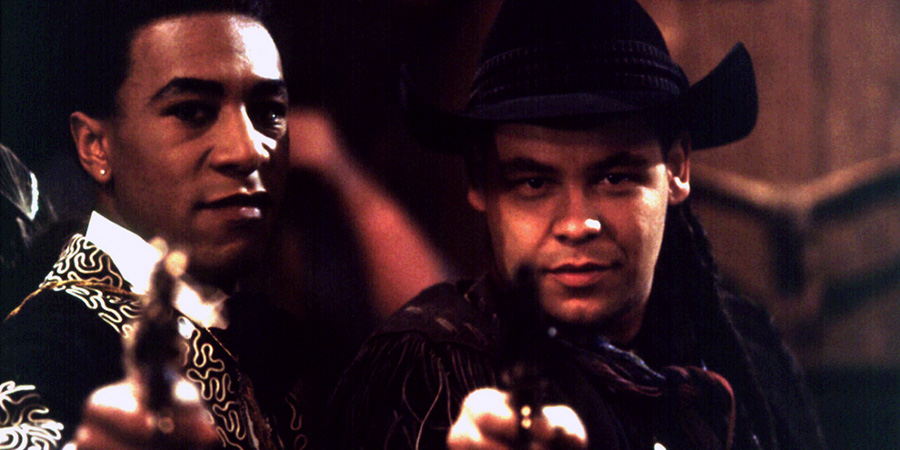
Now known more as a journalist and commentator, Street-Porter's role at the BBC in 1993 was to liaise between the corporation and Red Dwarf's production company, Noel Gay Television. Charles Armitage helped run the company and was called to a meeting. Doug Naylor recalled:
He went to see her, and she said, "I've just read the Gunmen script. It's absolutely stupid, it's totally impossible to shoot, tell those guys they've got to bin this and start on a new show." Charles was able to say, "Sorry, I'm not able to do that, because we shot it yesterday." Which is still one of his favourite stories!
Meanwhile, the cast were all excited at the prospect of starring in a western. Danny John-Jules was instrumental in the characterisation of the Cat's Mexican alter ego, The Rivera Kid. He requested the jingle and choreographed a little dance each time his name was mentioned; Danny even learned to twirl the character's twin revolvers on each finger (which were real and apparently weighed a ton). All this contributed to a lovingly-created episode which put a new spin on Red Dwarf's previous ventures into the world of simulated reality video games: Kryten battles a computer virus, forcing it to manifest as an outlaw gang of cowboys. The group were known as Famine, Pestilence, War, and Death and they were on an unrelenting mission to wipe out the crew.
The episode was not only as funny as any other, but it was also peppered with moments that put stakes above the laughs. A scene where Kryten shuts his consciousness down to fight the virus stands out. 'Is there anything we can do?! Can we help?' Lister desperately asks of Kryten. 'Watch my dreams,' comes his haunting reply before he slips away.
It was Rob Grant and Robert Llewellyn who headed out to the States to receive the Emmy when it came. It was a joyful occasion for the entire team, but it was bittersweet, as it came at something of an unfortunate time - Rob Grant and Doug Naylor as a writing team were about to head their separate ways.
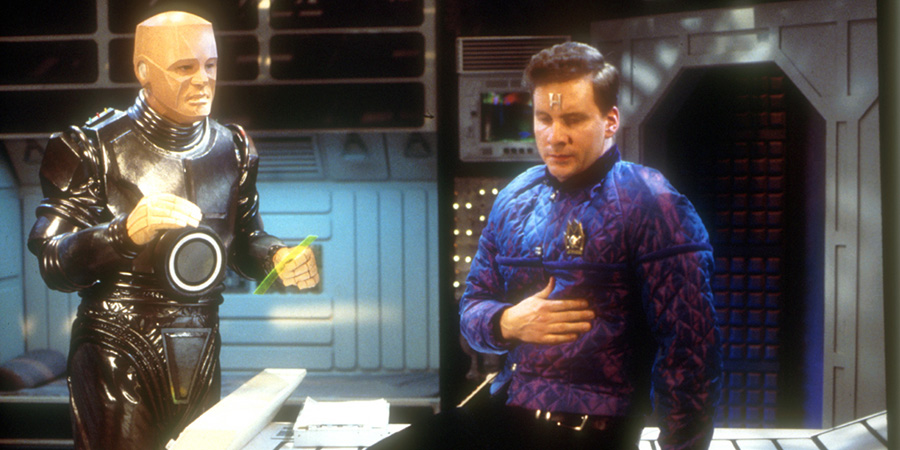
When a double act breaks apart, we as the audience naturally want to find out why. It seems tabloid-ish and impolite to start ruminating on why Rob and Doug split their partnership, but it has been the question on the lips of Red Dwarf's fans for many years. Doug Naylor was asked about it back in 2005 and he said simply: "I'm sure people want to know what the reason was, and if anyone ever finds out, give me a ring."
However, Rob Grant told the popular documentary series Comedy Connections the previous year: "It had got so that we weren't doing anything else except Red Dwarf. We were doing the novels, we were doing the TV show, we were doing the American version, in-between we were looking at the games and all kinds of things, and I just felt like I'd had enough of that and wanted to do something else."
The rest of the sitcom's cast and crew felt as in the dark about the situation as everyone else. Llewellyn recalled trying to broach the subject with Grant at the time, but despite spending notable time together celebrating the Emmy win, he didn't reveal what had caused the split.
Whatever the case, Grant and Naylor's workload had become relentless and a commitment to the ITV sitcom The 10%ers had put further strain on their writing partnership; yet, the scripts for their shows remained as strong as ever. Legion in particular was a triumph of sci-fi fantasy storytelling, and as the recordings of Red Dwarf VI went on, the fans were loving every moment.
Then we come to the series finale, rather ingeniously foreshadowed in the episode Rimmerworld, which revealed that something awful had happened to Mister Lister - but what was it? Well, apparently the writers were as unsure about this as viewers at home were. How was the series going to end? Was it going to draw a line under Red Dwarf for good? Everything seemed precarious, balanced on a knife-edge and no script was forthcoming.
Doug Naylor said: "I can't really explain why the show was late. There are always good reasons. Not because we weren't doing any work, it wasn't anything to do with that. Generally, when we're late with a script, it's because we're constantly rejecting ideas which we don't feel are good enough. Because there's nothing that really inflames our imagination and we're holding out for something terrific. It's only when they go: 'Guys! You've got to write something now!' you have to give up on those dreams of being able to write something... you know, great. We'd been in situations like this before, and Rob I have to say, was terrific at holding his nerve!"
The final script only arrived in its completed form the day before the pre-recording date. There was no time to cast it, no time to build new sets and no time for the cast to learn their lines. Autocue screens were placed all around the set, poised and ready to go, in order to help the actors as much as possible.
"I personally was just worried about the audience seeing us using autocue,' Danny John-Jules revealed. "Maybe they would have felt they were being cheated and they wouldn't laugh. You've got an audience sitting there, waiting to be entertained. It wasn't very comfortable thinking, 'My God!' someone's going to shout out, 'They've got seven autocues there!'"
Doug Naylor pointed to the fact that one of the most iconic sitcom episodes of all time, Hancock's The Blood Donor had been read almost entirely off written boards, and that was filmed in 1961. It could be done, and audiences at home would never be able to tell, unless they knew to look for it.
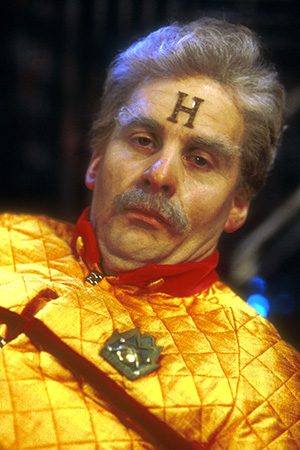
Fortunately, the newly scripted scenes largely occurred toward the end of the episode (aptly titled Out Of Time). The Dwarfers were engaged in an intense battle with their future selves, who had turned evil after a life of excess enjoyed through their discovery of a Time Drive (which allowed them access to all of time and space and a chance to hobnob with some of the more dubious figures from history). Therefore, the characters were meant to have their eyes glued to the ship's monitors, poised for an attack. Robert Llewellyn even swore he had seen Doug Naylor writing new lines into the script as it was scrolling before his eyes. But by some miracle, they got through the live studio recording - and in record time to boot.
However, there was still much debate about the ending. Rimmer declares: "Better dead than Smeg" as they do battle, but the crew are killed by explosions. Ironically, there was something of a genuine near miss at the recording of Emohawk: Polymorph II as one explosion packed so much punch that it embedded Kryten with tons of debris and injured Danny John-Jules. Fortunately his injuries were not serious and Kryten has spare heads, as we all know. But in this series and in Out Of Time particularly, the explosions certainly looked the part. It seemed as dramatic as Red Dwarf had ever been. The crew were plucked off one by one until only Rimmer remained, trying desperately to rouse a dying Kryten: "Speak, Kryten! How can we change what's happening?"
Then Rimmer, in a rare act of heroism, saved the day by blasting the Time Drive to pieces, wiping out their future selves and creating a paradox.
The studio audience then witnessed a happy conclusion for the crew; one in which they all drank cocktails in celebration of Rimmer's quick thinking, toasting the present with urine re-cyc. However, that was not the version that millions of BBC2 viewers eventually saw. Doug Naylor told the making of documentary:
We just looked at that in the edit and I just felt it was kind of "too pat" and just "so what?" and kind of "too neat". And I thought, "ah, well, there's an opportunity here of ending on a cliff-hanger, if we just go back a bit".
Robert Llewellyn described seeing the new ending, ominously showing Starbug itself exploding with a legend proclaiming 'To be continued', as "spooky". This was largely because the future of Red Dwarf itself seemed to be hanging in the balance, and this creative choice for a series finale seemed to underline that feeling.
Despite all the successes and every award that was heaped upon Red Dwarf this was the end as far as Rob Grant and Doug Naylor's writing partnership was concerned. However, it would not prove to be the end of Red Dwarf, even if it did take three years to return. And that revival was largely due to the fact that Doug Naylor was absolutely determined not to end the show on an unresolved cliff-hanger. Big changes and huge departures were on the way as Series VII loomed on the horizon.
Help us publish more great content by becoming a BCG Supporter. You'll be backing our mission to champion, celebrate and promote British comedy in all its forms: past, present and future.
We understand times are tough, but if you believe in the power of laughter we'd be honoured to have you join us. Advertising doesn't cover our costs, so every single donation matters and is put to good use. Thank you.
Love comedy? Find out moreRed Dwarf VI

Another series of Red Dwarf jam-packed with extras, alonside the show itself. Includes all 6 episodes from Series 6.
First released: Monday 21st February 2005
- Distributor: 2 Entertain
- Discs: 2
- Subtitles: English SDH
- Catalogue: BBCDVD1372
![]() Buy and sell old and new items
Buy and sell old and new items
Search for this product on eBay
BCG may earn commission on sales generated through the links above.
- Distributor: 2 Entertain
- Region: 2
- Discs: 2
- Subtitles: English SDH
- Catalogue: BBCDVD1372
![]() Buy and sell old and new items
Buy and sell old and new items
Search for this product on eBay
BCG may earn commission on sales generated through the links above.
- Released: Monday 12th September 2016
- Distributor: BBC Worldwide
BCG may earn commission on sales generated through the links above.
Red Dwarf - Complete Series I - VIII

For the first time, own the first eight series of the smash hit British comedy on Blu-ray - remastered in high-definition.
Chicken soup machine repairman and intergalactic loser Dave Lister awakes from suspended animation to discover he is the lone survivor of a radiation leak and is now three million years into deep space and the last surviving member of the human race.
Dave is soon joined by Arnold J. Rimmer, a hologram of his dead bunk-mate, a life-form who's evolved from his pet cat and Kryten, a neurotic sanitation mechanoid. Together this unlikely bunch of heroes attempt to find their way back to Earth, under the guidance of Holly, the ship's senile computer. Along the way they'll be brought back to reality, lose their mothership, become stranded on Starbug, bump into Lister's ex-girlfriend and find themselves back on Red Dwarf where the original crew have been resurrected by nanobots.
First released: Monday 14th January 2019
- Distributor: BBC
- Region: B
- Discs: 19
- Minutes: 1,466
- Subtitles: English
- Catalogue: BBCBD0441
![]() Buy and sell old and new items
Buy and sell old and new items
Search for this product on eBay
BCG may earn commission on sales generated through the links above.

